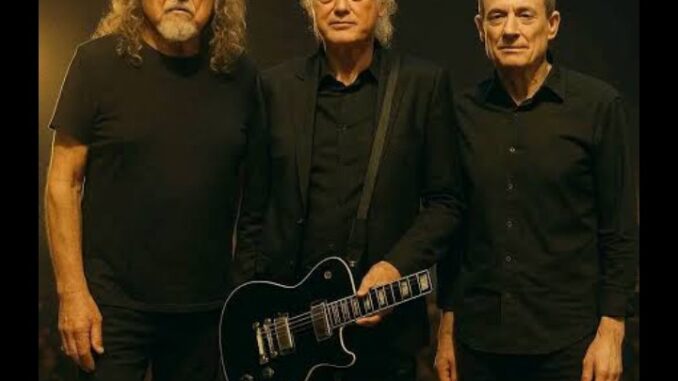
Led Zeppelin Reignites Rock’s Eternal Flame — Celebrating Legacy, Power, and the Timeless Spirit of Musical Revolution
More than five decades after they first shattered the boundaries of music, Led Zeppelin remains the eternal heartbeat of rock. Their sound — a thunderous fusion of blues, folk, mysticism, and raw electricity — continues to inspire generations of artists and fans worldwide. Today, as their legacy is celebrated anew through remastered albums, documentaries, and special tributes, Led Zeppelin’s fire still burns as fiercely as ever, reminding the world why they are not just a band, but a phenomenon that redefined modern music.
Led Zeppelin was born in 1968, forged from the vision of Jimmy Page, the band’s mastermind guitarist, who assembled Robert Plant, John Paul Jones, and John Bonham into a lineup that would forever change rock’s trajectory. What began as a continuation of The Yardbirds evolved into something entirely new — a sound that was heavier, darker, and more powerful than anything the world had ever heard. From the first roaring chords of “Good Times Bad Times,” listeners knew they were witnessing a revolution.
Their self-titled debut album, “Led Zeppelin” (1969), announced their arrival with unapologetic force, blending blues roots with explosive energy. It was followed by “Led Zeppelin II” later that same year — a record that solidified their dominance. Songs like “Whole Lotta Love,” “Heartbreaker,” and “Ramble On” showcased their unmatched chemistry: Page’s guitar wizardry, Plant’s golden wail, Jones’s intricate musicianship, and Bonham’s titanic drumming. Together, they didn’t just play rock — they elevated it into an art form.
But it was “Led Zeppelin IV” (1971) that truly immortalized them. Released without a title or band name on the cover, it became one of the most iconic albums in music history. “Stairway to Heaven” — perhaps their most legendary track — transcended genre, time, and language. Its haunting intro, mystical lyrics, and climactic guitar solo became a spiritual experience for millions. Even today, more than 50 years later, the song remains a timeless anthem of transcendence and transformation.
What made Led Zeppelin unique wasn’t just their sound, but their attitude. They refused to conform to industry norms — no singles, no flashy publicity, no compromises. Their concerts were epic journeys, filled with improvisation and emotional intensity. Songs stretched beyond their studio versions, morphing into spontaneous displays of virtuosity and passion. From Madison Square Garden to Earl’s Court, their live performances became the stuff of legend, often described as “religious experiences” by those lucky enough to attend.
At the heart of their magic was John Bonham, whose drumming remains unmatched. His thunderous beats on “When the Levee Breaks” and “Kashmir” defined power drumming for generations. His death in 1980 marked the end of an era — Led Zeppelin disbanded shortly after, refusing to continue without him. It was a rare act of integrity in the music world, proving that Zeppelin was built not just on fame, but on brotherhood and artistic purity.
Decades later, their influence continues to ripple through music. From hard rock to heavy metal, from blues revivalists to alternative bands, the Zeppelin spirit can be felt everywhere. Artists like Foo Fighters, Greta Van Fleet, and Jack White have openly credited them as a foundational influence. Even hip-hop and electronic producers sample their riffs, drawn to the primal energy that never fades.
In recent years, Led Zeppelin’s music has been rediscovered by new generations through streaming platforms, documentaries, and the band’s meticulous remasters. Jimmy Page’s dedication to preserving the band’s sonic quality has given fans pristine versions of their classics, while Robert Plant continues to perform with soul and grace, exploring new musical directions yet always carrying the Zeppelin flame.
The 2007 “Celebration Day” reunion concert at London’s O2 Arena was proof that their magic endures. With Jason Bonham — John’s son — behind the drums, the surviving members delivered a performance that left the world spellbound. Critics hailed it as one of the greatest live comebacks in rock history, a fitting tribute to their unparalleled legacy.
But beyond records, tours, and accolades, Led Zeppelin’s true legacy lies in the way they made people feel. Their music was not just heard — it was experienced. It captured the chaos and beauty of life, the clash between power and vulnerability, light and shadow. Whether through the mystic landscapes of “Kashmir,” the thunderous drive of “Black Dog,” or the tender ache of “Thank You,” Zeppelin’s songs spoke to something primal in the human spirit.
Today, as fans old and new celebrate their music, Led Zeppelin remains a symbol of freedom, creativity, and rebellion — proof that great art never dies. Their legacy is not frozen in the past; it’s alive in every guitarist who plugs in an amp, every vocalist who dares to scream their truth, and every listener who feels goosebumps at the opening chords of “Stairway to Heaven.”
In a world that often feels manufactured and fleeting, Led Zeppelin stands eternal — a reminder that true greatness is born from passion, authenticity, and the courage to break boundaries.
Led Zeppelin didn’t just create music — they built a universe of sound, emotion, and power that will echo forever. ⚡
Leave a Reply